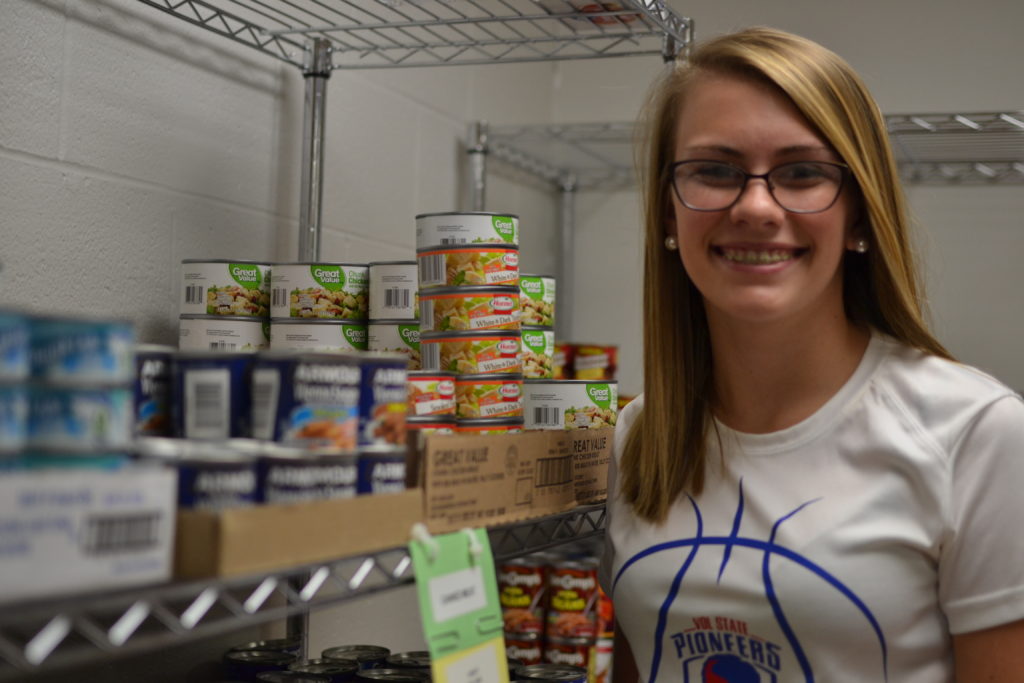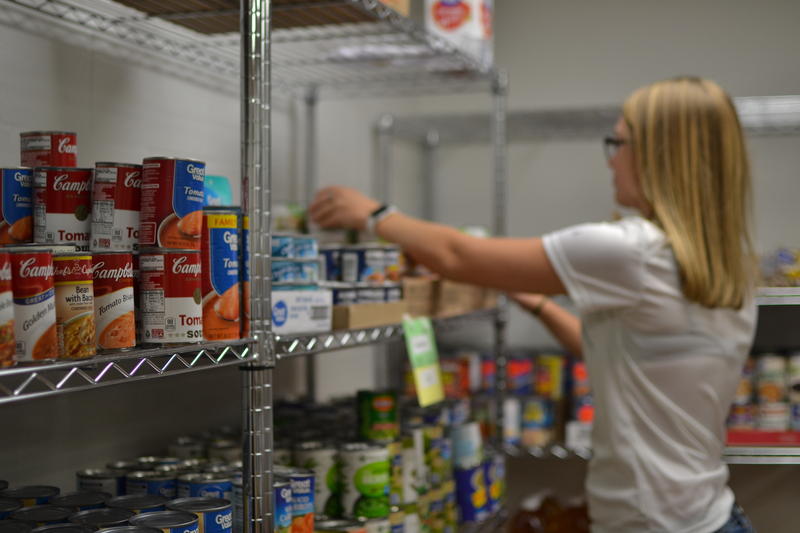
Tennessee has been praised for making community college more accessible by giving graduating high schoolers free tuition. But schools in the state have found the free college initiatives are not helping many of the lowest-income students, and some are trying to find ways to fill in the gaps.
Nestled in the back of Volunteer State Community College is the Feed. It’s a pantry where students can acquire free food, hygienic products and school supplies. Inside, first-year student McKenzie Wallace is helping a few of her classmates pick out items.
“Ramen noodles, you know the hormel meals, the little cans of ravioli. Some people come in and get cereal,” says Wallace, pointing around the Feed. “We’ve had some come in and get diapers.”
Wallace came to Vol State’s campus in Gallatin, Tennessee, so she could fulfill her dream of playing college basketball. But now, she struggles to pay about $850 each month for her apartment, books, gas, food and other living expenses.
She works at the Feed because she likes the program’s mission. She also needs the money. Her family only brings in one primary source of income for six children — a situation that can cause a lot of stress.
“I started freaking out. Well, do I really want to put my family through all that?” said Wallace. “Because they know it’s my dream to play college basketball, play at the next level. And they didn’t want me to have to give up my dreams because money wasn’t right.”
‘Free College’ Isn’t Totally Free
Wallace is actually a recipient of Tennessee’s landmark free community college initiative, the Tennessee Promise. But now that the scholarship is in its fourth year, many schools are realizing it can still leave low-income students like Wallace struggling financially.
That’s because Tennessee Promise is a last-dollar scholarship, which means it only covers tuition — and only after other sources of both state and federal aid, including the Pell Grant, have been applied.

As a result of that model, low-income students can actually receive less aid from the scholarship than their wealthier classmates, who
don’t qualify for other assistance. That leaves underserved students stressed to pay for basic living costs and textbooks, while more well-off students receive — in effect — extra benefit.
That’s what happened to Wallace.
“I received the Pell Grant and it covered my tuition fees,” she said, which means the Tennessee Promise didn’t give her any additional funding. “But then I didn’t have enough to buy books and stuff throughout the semester.”
Another first-year student at Vol State, D’Tonio Northington, says his financial strains are even more extreme. He was once a Tennessee Promise student, but he lost the scholarship, he says, because he couldn’t fulfill the program’s community service requirements. He had to spend that time working.
His tuition is still covered through the Pell Grant and another federal aid program called Gear Up. But, even though he receives financial aid refund checks, he doesn’t use the extra money for school.
Instead, it goes to his single mother for housing and food.
“Even though I got the refund, it was a good lift on money for me as an individual,” said Northington. “But once again, bills. I use the money to help out with that.”
Because of this situation, Northington says he feels like an outcast at school and his academic record has also taken a hit. He recently started to skip class, he says, so he can work more hours in order to pay for his textbooks.
“It’s really that sad, because as a person my age, I shouldn’t have to worry about these things, you know?” said Northington. “I should be worrying about my education.”
Colleges Can Only Do So Much
Faculty members at Vol State agree: Students shouldn’t have to make this type of choice. But it’s not always apparent to administrators who might need the help.
That was the case for Lori Miller, administrative assistant at the school. She realized the scope of the problem after a Wisconsin Hope Lab study showed more than a third of students are housing or food insecure.
“That was very shocking to me, because I went to school here,” she said. “And then I understood that, when we had an event on campus that offers food, once I started seeing all the kids show up there, I was like, ‘OK, this makes sense. They literally are hungry.’ “

When Vol State conducted its own survey of students, it showed around two-thirds weren’t able to provide enough food for themselves. Since the school opened the Feed last year, students have already visited more than 500 times.
The school also offers scholarships to help students with expenses like books, officials say.
But Miller says the school and faculty can only do so much to help students with those costs.
“I want to fix all their problems. I mean, I’m a mom. As an administrator, if somebody comes in and they say ‘I need,’ I just want to give. I don’t have the unlimited funds to do that,” said Miller.
Focus On Completion After Enrollment
So, for concerned educators and policymakers, a question lingers: If free tuition isn’t making higher education more accessible, what needs to happen next?
Mike Krause is the executive director of the Tennessee Higher Education Commission, which oversees how financial aid, like Tennessee Promise, is distributed and implemented.
“We don’t view Tennessee Promise as a silver bullet. We know it has to be part of a larger patchwork,” said Krause.
He argues the initiative has helped low-income students, because it’s increased discussion around college. The messaging around financial aid was too complicated, he says, which means many students who would have already qualified for free tuition never bothered applying.
And since students can only receive the Tennessee Promise scholarship if they complete the FAFSA, the program has gotten more high schoolers to apply for financial aid in the first place.
Still, Krause acknowledges more has to be done, and that’s a focus on college completion, not just enrollment.
“If we want to raise retention rates, we’re going to have to be really focused on taking down any possible barrier, making sure when a student goes to school, they are really able to focus on the academics,” said Krause.
That means providing at-risk students services like counseling, food pantries and emergency grants, he says. As it stands, the state only has one other non-merit scholarship for low-income students that could help them pay for expenses outside of tuition. Even that scholarship counts against the amount of aid a student could receive from Tennessee Promise.
Unless there’s greater focus on these costs, basic expenses could derail hard-working students from being able to complete their degrees, says Krause.


